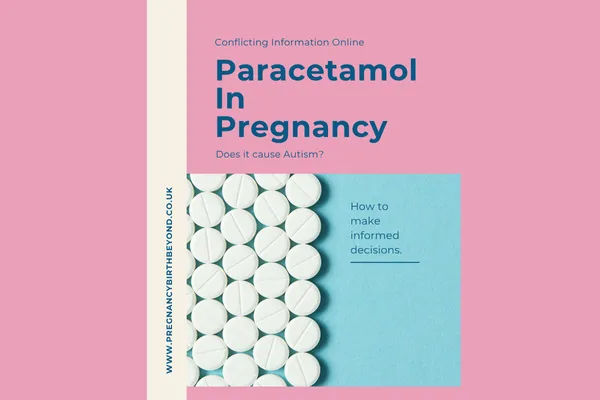
Confused About Paracetamol In Pregnancy? Learn The Evidence, Why NSAIDs Aren’t Safe, And How The BRAIN Acronym Helps You Decide

Making Informed Decisions in Pregnancy: Cut Through the Noise & Find Calm
Pregnancy comes with so many decisions. What to eat. Which birth class. Whether to take this medication or that. Feeling overwhelmed is totally normal—especially when voices from politics, social media, family, and health “experts” diverge.
Today I want to help you navigate one hot topic: should you avoid paracetamol (acetaminophen) in pregnancy? There has been recent conflicting coverage—let’s look at what evidence says, what reputable bodies are advising, what you shouldn’t use instead, and how hypnobirthing tools can help you stay grounded while making choices.
The Controversy: What’s Being Said
Recently, there have been claims from Donald Trump, that using paracetamol during pregnancy is linked with increased risk of autism or neurodevelopmental disorders in children. Because these claims are high-profile, they spread fast—but do they hold up?
Many medical/regulatory bodies have pushed back:
UK’s Medicines & Healthcare products Regulatory Agency (MHRA) reports that there is no evidence that paracetamol use during pregnancy causes autism.
Non-steroidal anti-inflammatory drugs (NSAIDs) like ibuprofen are not generally recommended during pregnancy (especially later stages), due to known risks.
Royal College of Midwives says paracetamol remains first-line pain/fever relief, with no evidence of harm when used correctly.
Australian regulators (TGA), obstetricians and midwives have also dismissed the claims as “baseless” or lacking in sound evidence.
What the Evidence Actually Shows
Here’s a breakdown of the strongest evidence so far:
Ahlqvist et al., 2024 (JAMA, ~large study on 2.5 million Swedish children, including sibling comparisons) highlights slight associations between maternal acetaminophen / paracetamol use and autism / ADHD / intellectual disability; but in sibling controls (which control for family/genetic/other shared risk) no increased risk was found. This study disputes recent claims as it recognises previous associations could be explained due to confounding factors—not a causal effect.
MHRA “Drug Safety Update” confirms paracetamol remains safe during pregnancy, when used as directed (lowest effective dose, shortest time). It does however acknowledge that NSAIDs e.g. Neurofen, Ibuprofen, Volterol have more risk, so switching to NSAIDs instead is not recommended.
Risks with NSAIDs vs Paracetamol
It’s not just about whether paracetamol might be safe—it’s comparative: what alternatives might bring more risks.
NSAIDs (e.g. ibuprofen, naproxen) are generally not recommended, particularly in the third trimester, because of risks to the baby's heart and kidney issues, along with low amniotic fluid.
Some NSAIDs also associated with miscarriage risk if used early in pregnancy.
So while all medications have potential risks, the balance of evidence (so far) supports paracetamol, used correctly, as safer compared to many NSAIDs.
What “Safe Use” Means & How to Decide
From what we know:
Use only when needed (pain, fever)
Use the lowest effective dose
For the shortest duration necessary
Always under guidance from a healthcare provider if usage is frequent or long-term
Using the BRAIN Acronym to Guide Your Decisions
In KG Hypnobirthing we discuss how to use the BRAIN acronym to help give you simple, powerful tools to navigate choices in pregnancy and birth.
B – Benefits
What are the benefits of taking paracetamol right now? (e.g. reducing fever, easing pain, helping you rest)R – Risks
What are the risks of taking it? And importantly—what are the risks of not taking it? (e.g. untreated fever can be harmful to both you and your baby)A – Alternatives
Are there other options? Sometimes rest, hydration, or relaxation techniques may help. But if pain or fever persists, medication may be the best option.I – Intuition
How do you feel about this decision? What does your gut say when you step away from fear and focus on calm?N – Nothing / Next
What happens if you do nothing for now, or wait a little longer? What’s the next step if symptoms continue?
Reassurance & What You Can Do
You’re not alone in being confused by all the mixed messages. Here are some things that may help you feel more grounded:
Lean on trusted health bodies (MHRA, NHS, WHO, Midwives, GP's) rather than headlines or political statements.
Keep notes of what you’ve read and ask your healthcare provider in person: “What do you recommend based on my medical history?”
Use relaxation/mindset tools from hypnobirthing: breathing, visualisation, relaxation tracks. These reduce anxiety, which helps decision-making by keeping your cortex functioning well (fear can trigger more instinctive, less logical responses).
Discuss with your birth partner or someone you trust. Talking things through helps you spot what matters most to you.
Summary: What the Current Guidance Suggests
Please take comfort and feel confident that there is sufficient evidence based research that supports, paracetamol used correctly in pregnancy, is safe.
Paracetamol remains the first-line, generally safe option when used correctly (lowest dose, shortest time) in pregnancy.
There is no strong evidence at this time that paracetamol causes autism or ADHD etc., especially when confounding factors are accounted for.
NSAIDs pose more known risks, particularly later pregnancy, and should be avoided or used only under medical supervision.
You always have tools—like the BRAIN acronym and relaxation practices—to guide you through decisions with confidence.
Pregnancy doesn’t have to feel like a minefield of conflicting advice. With the right evidence and the right mindset, you can stay calm, informed, and empowered. When faced with conflicting information, anxiety can cloud your thinking. That’s why relaxation techniques are so important. They calm your nervous system, reduce adrenaline, and allow you to think more clearly.
👉 Download your free pregnancy relaxation here to support decision-making with a calm and clear mind: digital.pregnancybirthbeyond.co.uk/relaxationaudio
References / Further Reading
Ahlqvist VH, et al. Acetaminophen use during pregnancy and children’s risk of autism, ADHD, and intellectual disability. JAMA, 2024. JAMA Network
UK MHRA: Paracetamol and pregnancy: reminder that taking paracetamol during pregnancy remains safe. GOV.UK
Tadokoro-Cuccaro, R. et al., Maternal Paracetamol Intake During Pregnancy—Impacts on Fetal Sex Development etc. PMC
FDA drug safety communications on NSAIDs in pregnancy. U.S. Food and Drug Administration

